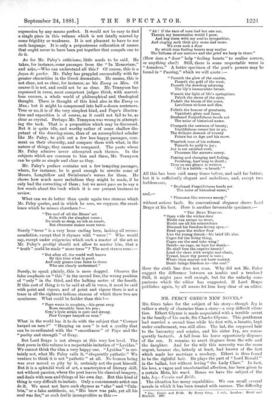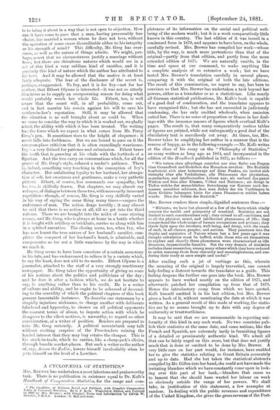MR. PERCY GREG'S NEW NOVEL.*
Mn. GREG takes for the subject of his story—though Ivy is rather a study of character than a story—a very difficult Ethert Glynne is made acquainted with a terrible secret in the family of his uncle, Sir Charles Glynne. This gentleman had married a second time while his first wife, a lunatic, kept under confinement, was still alive. The lad, the supposed heir to the baronetcy and estates, and his sister Ivy, are conse- quently bastards. A fall from his horse opportunely disposes of the son. It remains to avert disgrace from the wife and the daughter. And for the wife this necessity was the more urgent, because she, latterly at least, had known of the fact which made her marriage a mockery. Ethert is thus found to be the rightful heir. He plays the part of "Lord Ronald" in the ballad, but without loving " the Lady Clare." In fact, his love, a vague and unsubstantial affection, has been given to a certain Meta, his ward. Hence we have the subject of the tale, Ivy : Cousin and Bride.
. The situation has many capabilities. We can recall several novels in which it has been treated with success. The difficulty
ivy: Cousin and Bride. By Percy Greg. 3 vols. London: Hurst and Blackett. 1881.
is to bring it about in a way that is not open to objection. How can it have come to pass that a man, having presumably free choice, has married a woman whom he does not love, without the operation of some cause discreditable either to his integrity
or his strength of mind This difficulty, Mr. Greg has over- come, as well as the nature of things admits. We might, per- haps, assert that no circumstances justify a marriage without love ; but there are chivalrous natures which would see in a act of this kind a very sublime kind of sacrifice, and it is precisely this kind of nature which the author has attributed to his hero. And it may be allowed that the motive is at least fairly adequate. The fear of the disclosure of the secret is, perhaps, exaggerated. To Ivy, and it is for Ivy—not for her mother, that Ethert Glynne is interested—it was not so utterly disastrous as to supply an overpowering reason for doing what would probably wreck her whole life. Ethert, too, is well aware that the secret will, in all probability, come out, and in fact marries his cousin against his will to save his mother-in-law's reputation. Still, it may be allowed that the situation is as well brought about as could be. When we come to consider the way in which it is worked out, we gladly admit the ability with which it has been treated. The writing has the force which we expect in what comes from Mr. Percy Greg's pen. It sometimes rises to the height of eloquence ; it never falls into feebleness. But we are bound to pass on it the common-place criticism that it is often exceedingly wearisome. Ivy is a very Grissel for patience and submission. Ethert bears the tooth that is gnawing at his vitals with the fortitude of a Spartan. And the two carry on conversations which, for all the graces of Mr. Greg's style, exhaust a reader's patience. There is, indeed, something very touching in the conception of Ivy's character. Her unfaltering loyalty to her husband, her abnega- tion of self, her sweetness and gentleness, make a very pathetic picture. Ethert, of course, less commands our sympathy, but he, too, is skilfully drawn. But chapters, we may almost say volumes, of dialogue between these two, with necessarily incessant repetition—though, of course, Mr. Greg is very skilfully varied in his way of saying the same thing many times—surpass the endurance of man. The action drags terribly ; it may almost be said that there is no action at all, till we get into the third volume. There we are brought into the midst of some stirring scenes, and Mr. Greg, who is always at home in a battle whether it is fought with artillery or brickbats, carries us along with him in a spirited narrative. The closing scene, too, when Ivy, who has now learnt the true nature of her husband's sacrifice, com- pletes the conquest of her husband's heart, is admirable, and compensates us for not a little weariness by the way in which we reach it.
Mr. Greg seems to have been conscious of a certain monotony in his tale, and has endeavoured to relieve it by a variety which, to say the least, does not add to its merits. Ethert Glynne is a journalist, attached to the staff of a very strongly reactionary newspaper. Mr. Greg takes the opportunity of giving us some of his notions about the politics and politicians of the day ; and he does it after a fashion which, we do not hesitate to say, is anything rather than to his credit. He is a writer of culture and ability, and he ought to be ashamed of descend- ing to the scurrility of which the political chapters of this book present lamentable instances. To describe one statesman by a stupidly injurious nickname, to charge another with deliberate falsehood and hypocrisy, to shower on all political opponents the coarsest terms of abuse, to impute action with which he disagrees to the vilest motives, is unworthy, to regard no other consideration, of a writer of position. Readers are prepared to take Mr. Greg seriously. A political mountebank may talk without exciting surprise of the Free-traders ruining the landed interest that they may buy estates the cheaper. This is his stock-in-trade, which he carries, like a cheap-jack's elixirs, through bucolic market-places. But such a writer as the author of, say, Across the Zodiac, lowers himself incalculably when he puts himself on the level of a Lowther.































 Previous page
Previous page